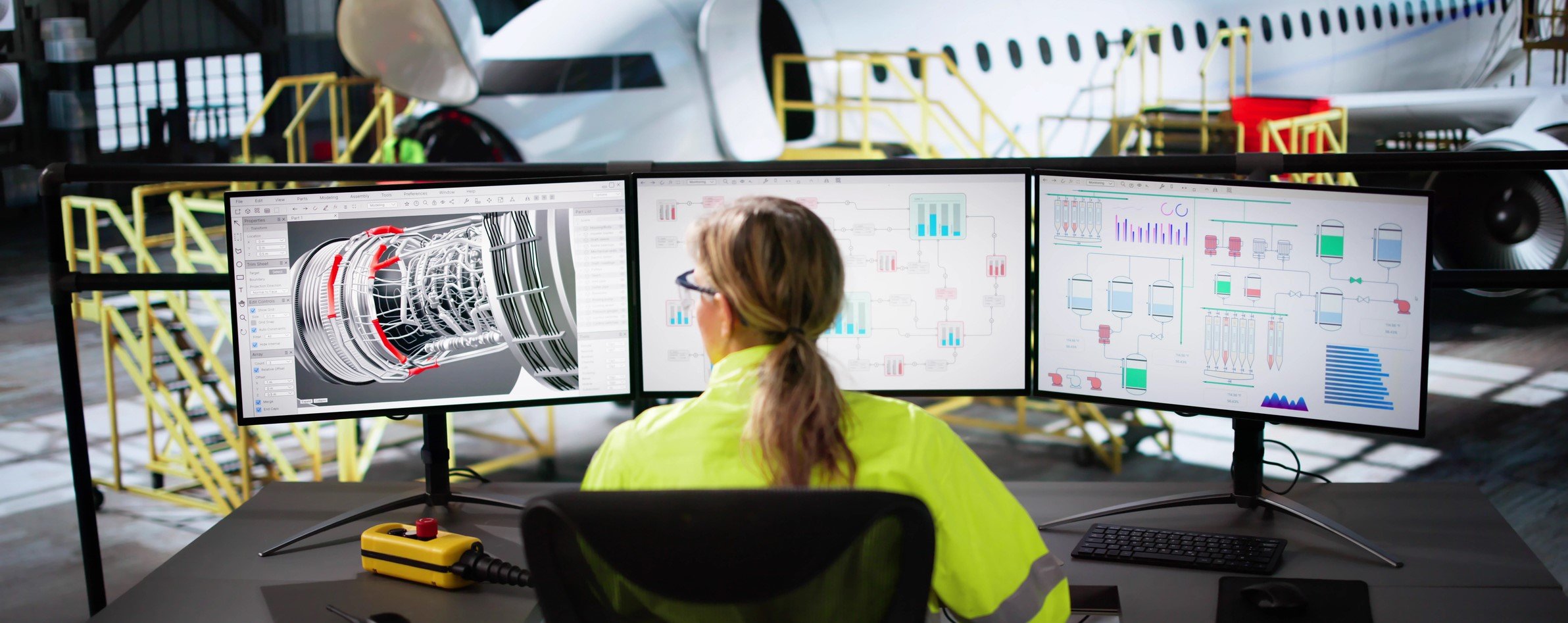
Global competition, technological shifts, and ongoing disruptions are reshaping aerospace. Thriving in this environment takes more than adaptation—it calls for strategic foresight and innovation. In our recent webinar, "Propelling Aerospace into the Future," Point B’s Lauren Edwards and Zameer Baber discussed how leaders can seize opportunities and overcome challenges by embracing digital transformation, rethinking workforce strategies, and strengthening supply chains. We’ve shared highlights and actionable insights from the discussion below.
Digital Transformation
Digital transformation is essential for improving operational efficiency and enabling data-driven decision-making. Yet, our proprietary research indicates that 70-80% of digital initiatives fail to achieve strategic objectives. The primary culprit? Misalignment between corporate and digital strategies.
Consider common challenges leadership must address when implementing digital transformation: integrating new systems into existing technology environments, upskilling teams to adapt to customer-centric, digital-first approaches, and cultivating a culture of innovation that embraces digital change. Although there are various tactics and strategies, starting with pilot projects can help organizations demonstrate value, secure stakeholder buy-in, and build momentum. The most effective transformations equip teams with the right tools and training, while fostering a culture where experimentation thrives alongside clear objectives.
When aligned with broader business goals, digital transformation delivers measurable ROI, from increased revenue and reduced costs to improved customer and employee experiences and enhanced innovation. During the webinar, our experts emphasized how digital transformation also drives workforce innovation and bolsters supply chain resilience.
Workforce Innovation and Skills for the Future
Technological advancements continue to reshape workforce needs. Demand for roles in engineering, cloud, data science, and AI is growing, but technical backgrounds alone aren’t enough to drive organizational performance. Employees need the right tools, time, and support to innovate and grow.
For example, training technicians on emerging tools like predictive maintenance algorithms builds familiarity with new processes. To fully realize these benefits, organizations must empower employees to apply their expanded skills and knowledge to their daily tasks. This not only enhances efficiency but also creates a better employee experience.
Tracking the impact of digital initiatives and related training is critical to achieving ROI. A culture of innovation requires giving teams the flexibility and confidence to adapt in a tech-driven landscape. Investing in upskilling is more than meeting workforce demands—it's a catalyst for organizational performance and resilience.
Supply Chain Resilience—A Strategic Imperative
Recent disruptions—from the pandemic to geopolitical challenges—have underscored the importance of agile, resilient supply chains. While digital tools such as AI-based risk assessments, digital twins, and contract lifecycle management platforms enhance efficiency, fostering transparency and collaboration across the supply chain can yield even greater benefits.
Optimizing supply chains through digital transformations not only reduces costs and mitigates risks, but can also increase revenue and improve customer satisfaction by delivering products and services more effectively.
Building a cohesive supply chain ecosystem, where partners innovate collaboratively, prepares organizations to weather disruptions. Real-time data integration and seamless collaboration between front and back offices empower decision-making and enhance resilience. The supply chains of the future are interconnected ecosystems where agility is a critical competitive advantage.
The Future of Aerospace
Over the next decade, technologies like machine learning, predictive analytics, and IoT will continue to reshape aerospace operations and culture. Embracing digital transformation isn’t optional, it’s essential for survival and growth.
The path forward lies in integrating innovative tools, empowering your workforce, and fostering resilient supply chains. By aligning digital initiatives with strategic goals, aerospace leaders can navigate today’s complexities and position their organizations for long-term success.

RELATED INDUSTRIES
RELATED SOLUTIONS





